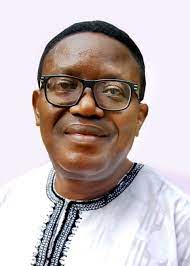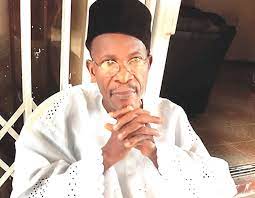
By Owei Lakemfa
I WAS a young Labour Reporter when I had my first encounters with Frank Ovie Kokori in 1984. He was a 41-year-old trade unionist who had been more of an industrial relations personnel. He had attended the University of Ibadan and worked with an industrial relations company owned by socialite and former trade unionist, Alhaji Babs Animashaun.
The latter had set Kokori on a life-long path of trade unionism when he assigned him to service the now defunct British Petroleum Workers Union. When the house unions were reorganised in 1977 into industrial unions, the union he serviced was scrapped and infused into the new National Union of Petroleum and Natural Gas Workers, NUPENG.

He applied to the new union and was employed in 1978 as the Deputy General Secretary. His boss was Asiya Effiom Otu. He had good company in NUPENG as the President of the defunct British Petroleum Workers Union he had served, Joseph Iranola Akinlaja, had a year earlier, been elected Vice President.
Kokori was a hands-on unionist and just a year later, employers tricked workers in the oil industry by invoking his name. It happened in 1979 when workers of Keydril Nigeria Limited went on strike over an agreement with their employers. The strike was on a rig. Akinlaja reminiscenced that: “The layout of the rig is like a mighty boat, the size of a little village, floating on water.” It was in the high seas at Escravos and reachable only by helicopter.
As the workers had barricaded the helipad, the employers could not land. So they played a trick on the workers by sending a radio message that Kokori, their union leader, was flying in from Lagos by helicopter to discuss with them. So, the workers should clear the helipad. But when the helicopter landed, it was not Kokori that emerged, but armed policemen. The troops seized the rig, evacuated the expatriates and manager, and flew out.
The management then switched off the electricity which also supplied water and made life liveable on the rig. So effectively, the striking workers were marooned. The workers lowered a life-boat into the high seas which got two of them ashore. The men headed to meet Kokori in Lagos and NUPENG sent out the news of employers marooning over 150 workers in the high seas. The workers were evacuated but the Keydrill management sacked them.
NUPENG reacted by mobilising other workers to shutdown oil production. To prevent this, other employers put pressure on the Keydril management which had no choice but to recall all the sacked workers. That laid a sound foundation of workers power in the oil and gas industry.
Another ploy by employers in the industry was to remove the NUPENG President John Enas Dubre who had been elected on November 2, 1977. Fifty nine days later, Dubre’s primary employers, the Nigerian Agip Oil Company promoted him Assistant Personnel Officer and said with that, he had become a senior staff, so he can no longer be a member of NUPENG nor remain union President. Dubre rejected the ploy and was supported by Kokori who was the union’s Deputy Scribe. But his boss, Mr Otu, the substantive scribe supported the management. A crisis engulfed the union and Mr Otu was retired paving the way for Kokori to become the NUPENG General Secretary.
The oil employers played a similar game with union Vice President Akinlaja. His primary employers, the British Petroleum in July, 1981 invited him to the Personnel Manager’s office, praised him for his outstanding performance and honesty and told him: “You are to be promoted senior staff now, and you will be in charge of the pump maintenance of the company all over the country.” But there was a conditionality: he has to resign as NUPENG Vice President before the letter of promotion can be issued to him. When he declined to resign, the company declared him redundant. But NUPENG appointed him, and he became Kokori’s deputy.
Perhaps Kokori’s greatest contribution to industrial relations and trade unionism in Nigeria was in the 1986-87 period when the crises in NUPENG threatened oil production. The crises had in 1984 led to a court barring Dubre from contesting the Nigeria Labour Congress, NLC, presidency which he was sure of winning. When following the court order, Team Dubre adopted Comrade Ali Chiroma of Medical and Health Workers Union, as its new candidate, the latter swept the NLC polls.
The crises had split NUPENG into two. One faction had Dubre, and later, Samuel Adewumi Dada of Gulf Oil (Chevron) as President and Kokori as Secretary. The other, had Richard Uzegbu as President, and veteran unionist, Alphonsus Igua Abaje Okwese as Secretary.
The NUPENG factions had 14 different cases in court with all sorts of orders from different judges. That was when Kokori concluded that the best way to show who actually has the support of the members of a fractious union, was to call a general strike in the industry. So, on Monday, May 16, 1986, his faction called out oil and gas workers on a national strike, not over socio-economic or political matters, but purely to determine who controls the workers.
Then Labour Minister, Rear Admiral Patrick Koshoni, declared the strike an economic sabotage punishable under Decree 31 which prescribed death penalty or 21 years imprisonment for violators. However, two days later, as the strike bit harder, the regime changed its mind and agreed that a unified conference of the union should be called. At the elections, the Kokori faction polled 200 votes and their opponents scored 17 votes.
In the July-August 1993 Pro-Democracy protests for the de-annulment of the 1993 presidential election, virtually all the trade unions, led by Paschal Bafyau, supported the military dictatorship.
When the same thing was about recurring under the Abacha dictatorship, I was part of the delegation of the Campaign for Democracy, CD, team led by Dr Beko Ransome-Kuti which held series of discussions with the trade unions led by Bafyau and Sylvester Ofili Ejiofor. Despite promises, only NUPENG led by Kokori and Wariebi Agamene, and the Petroleum and Natural Gas Senior Staff Association, PENGASSAN, led by its President Owodunni and Scribe, Milton Dabibi, took action. This led to the proscription of both unions and the NLC and the indefinite detention of the oil workers’ leaders.
Kokori was also, one-time the Executive Secretary of the Oil Mineral Producing Areas Development Commission, OMPADEC, established on July 23, 1992 and a noted political figure who was ever resolute in his pro-people stance. On Thursday, December 7, 2023 when Kokori clocked 80, many might have been preparing to wish him a happy birthday, unknown to them, at 1.30am Kokori had waved good bye to humanity.




GIPHY App Key not set. Please check settings